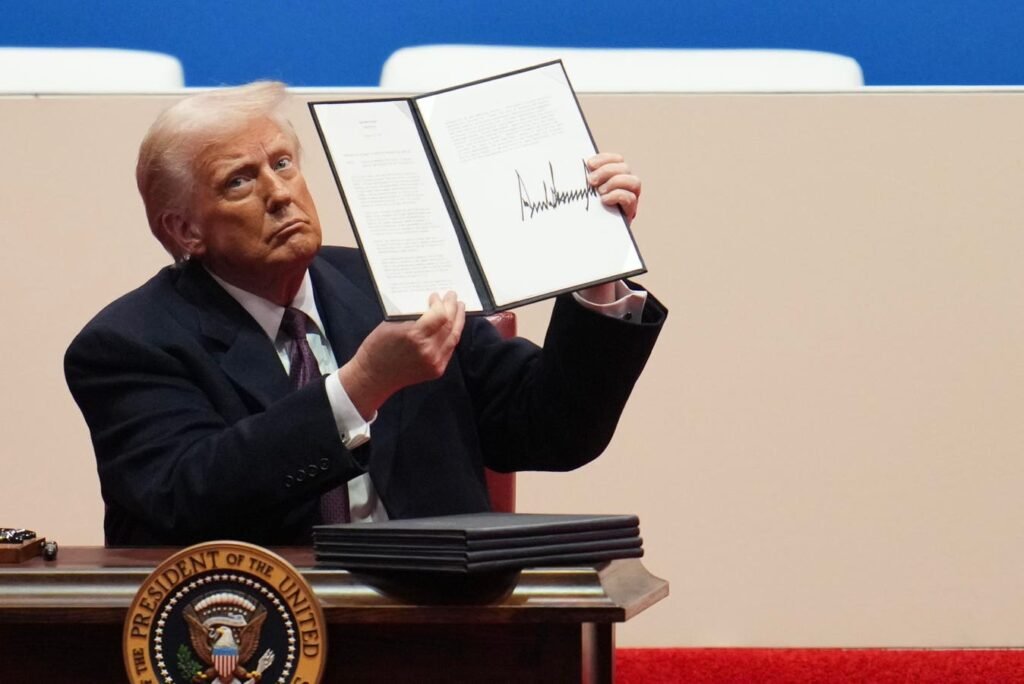WASHINGTON, DC – JANUARY 20: U.S. President Donald Trump holds up an executive order after signing … [+]
Getty Images
The beginning of President Donald Trump’s second term saw significant actions taken that impacted public health. One of the executive orders signed on his first day in office withdrew the U.S. from the World Health Organization (WHO), a move criticized by experts for potentially endangering global health security, as reported by Time.
Another executive order signed on the same day aimed at addressing concerns about freedom of speech and federal censorship, asserting that government actions had infringed on citizens’ speech rights under the guise of combatting misinformation.
The administration’s actions were largely in response to efforts to combat false information about COVID-19 and public health measures. The executive orders signed by President Trump raised concerns about the spread of misinformation and limited government involvement in addressing it.
Day Two Brought More Surprises
On Tuesday, January 21, the Trump administration halted external communications by staff of the Department of Health and Human Services (HHS) and its agencies, including the Centers for Disease Control and Prevention (CDC) and the National Institutes of Health (NIH).
An official memo from Acting HHS Secretary Dorothy A. Fink outlined restrictions on public communications and document releases, requiring approval by a Presidential appointee before dissemination.
The memo detailed various communication restrictions, including refraining from public document issuance and participation in public speaking engagements without prior approval.
WASHINGTON: The U.S. Department of Health and Human Services headquarters building is located at … [+]
Getty Images
The memo emphasized the need for communication review and approval, impacting the department’s ability to disseminate information without oversight. This directive affected various forms of communication and engagements, causing uncertainty among HHS employees and the public.
But Wait, There’s More…
Subsequent actions by the administration included the removal of government posts related to abortion, changes to enforcement guidelines for immigration agencies, and executive orders affecting healthcare coverage established under the Affordable Care Act.
The sudden restrictions on travel and communication by HHS employees and the halting of vital communications, including CDC updates and clinical trial information, raised concerns about the impact on public health efforts.
These actions signaled a significant shift in government communication and public health policy, prompting reactions from healthcare professionals and the research community.
On January 24, President Trump’s decision to terminate Dr. Anthony Fauci’s government security further underscored the administration’s changing approach to health and safety measures.
Dr. Fauci, a distinguished public servant with over 40 years of experience, has advised seven presidents and was awarded the Presidential Medal of Freedom by President George W Bush. Despite his dedication, he faced death threats during the COVID-19 pandemic and continues to be criticized by some of the current President’s supporters. According to The New York Times, President Trump defended his decision to remove Dr. Fauci’s security detail, stating that government employees eventually lose such protections.
In a recent development, the President suggested eliminating FEMA and threatened to withhold disaster relief from California. As a result, health communications in the country will now come from various non-governmental sources, leaving Americans to discern the truth amidst a sea of conflicting information from different sources.
The focus now shifts to the Senate, where the President’s nominee for the Department of Health and Human Services (HHS), Robert F. Kennedy Jr., a vocal vaccine skeptic, is set to testify before the Finance Committee. Despite concerns raised by NPR about Mr. Kennedy’s financial ties to a law firm suing Merck over a vaccine issue, his nomination is pending Senate approval. This raises questions about the future leadership of key health agencies like the NIH, CDC, FDA, and the U.S. Surgeon General, as their expertise may be overshadowed by political agendas.


